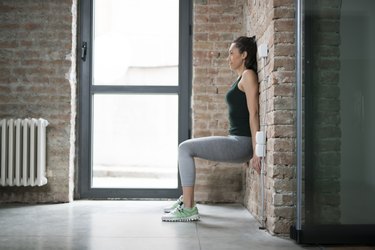
If you have arthritis in your knees or have suffered an injury, you may have lost some range of motion in your knees. Range of motion refers to the flexibility in your knee joint. It is important to be able to fully straighten and bend your knee as much as possible.
Without good range of motion, it is hard to climb stairs, bend down, get out of a chair and perform daily activities. Several knee range of motion exercises can be done at home, as demonstrated by the American Academy of Orthopaedic Surgeons.
Video of the Day
Video of the Day
To get the best benefits, do knee range of motion exercises every day. Your physical therapist may even suggest doing them two to three times daily if you are recovering from injury or surgery. Start slowly and always check with your doctor before starting any new exercise program.
1. Quad Sets
Quad sets, as demonstrated by Aurora Health Care, help you regain the flexibility needed to straighten your knee.
- Stretch your leg out on the floor or a bed.
- Place a towel roll under your knee or heel.
- Let gravity help you push your knee down and straighten it as much as you can.
- If tolerable, you can rest a weight on the top of your knee to help.
- Try to lift your heel and straighten the knee completely.
Tip
As your range of motion (ROM) gets better, make the towel roll bigger or use a large pillow. Eventually work up to sitting in a chair and try to lift your foot from the floor straight out in front of you.
2. Knee Flexion Exercises
Knee flexion exercises help improve range of motion so you can bend your knee as far as possible.
- Start by lying on your stomach.
- Bend your knee and bring the heel as close to your buttocks as possible.
- Hold for three seconds; then slowly straighten back out.
- Repeat 10 times.
Tip
As this exercise gets easier, work up to sitting in a chair and pulling your foot under the chair as far as you can. Use your other foot to help push your injured leg back further.
Eventually, try to stand, bend the knee and hold onto a pant leg or your ankle and squeeze the heel to your buttocks.
3. Wall Squats
If you are able to bear weight on your affected leg, wall squats help improve knee range of motion as well as strengthen the muscles that surround the knee joint.
- Stand a foot or two away from a wall and lean back so your head, upper back and buttocks are against the wall.
- Slowly bend your knees and slide down the wall until your thighs are parallel to the floor.
- Hold for three seconds; then slide back up into a standing position.
- Repeat 10 times.
Tip
As your strength improves, progress to the air squat, as demonstrated by ExRx.net.
Add Some Resistance
As your leg flexors and extensors become stronger, knee extensions and leg curls can be performed with ankle weights, elastic resistance or using weight-training equipment.
Progress gradually, and move your limbs slowly through their full range of motion. If using weight machines, work your limbs independently of one another to achieve balanced strength in both legs. Pain in your joints may indicate you have progressed too quickly.